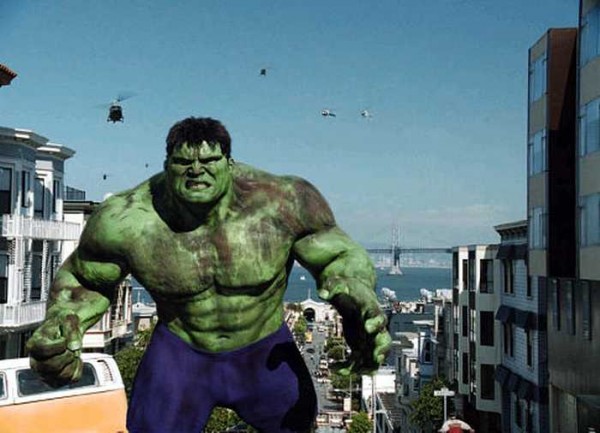
In a summer of big superhero releases, the fruition of Marvel’s dream project, The Avengers has been perhaps the most unlikely and impressive. Most surprisingly of all, the film has brought redemption to one hero no one expected would steal the show: The Incredible Hulk. Indeed, for many, The Avengers is the best Hulk film of all time.
However, as the dust settles, and we all quietly await the Hulk’s raging return, I believe now is the perfect time to look back at a previous chapter in the green one’s cinematic legacy. Redemption is in order for, arguably, the most maligned and misunderstood of the superhero films, Ang Lee’s Hulk (2003).
Immediately, the choice of director stands as a startlingly bold and somewhat bizarre choice. Before Hulk, Lee was considered an art house director, known for emotionally charged dramas and thoughtful adaptations such as Sense and Sensibility (1995) and The Ice Storm (1997). However, he had also proved with the worldwide hit Crouching Tiger, Hidden Dragon (2001), that he could handle stylised action in a fluid and dynamic style. Still, the choice of Lee was daring, and ultimately defines the tension between art and entertainment that, for me personally, only adds to the mood of a film. However, for those who simply wanted a Hulk that smashed for the purpose of…well, smashing alone, there would always be a problem.
Instead of a purely aggressive spectacle, Lee delivers a more psychologically driven, emotional piece exploring the origins of the rage that drives Bruce Banner’s transformation. In considering how the traumas of the past have affected the development of Bruce, both as a repressed scientist and the darker emotional monster within, Lee created a deeply sympathetic and multifaceted Banner/Hulk. This Hulk, while being true to the best of the comics, also channeled the spirit and tone of the classic movie monsters, in particular Boris Karloff’s tragic Monster in James Whale’s Frankenstein (1931), another freak of nature created by mad science.
Eric Bana delivers a tremendous performance considering the complexity of the role, carrying the film with great restraint and subtly. Where his breakthrough performance in Chopper (2000) is raw, electric and full of relentless energy, his performance as Banner is almost the exact opposite. Controlled yet edgy, Bana was able to embody a tortured soul who cannot control his inner rage, made all the more deadly by the loss of his mother and abandonment by his father. The film is at it’s strongest when Banner, rather than the Hulk, takes centre stage, a true testament to the strength of the performance.
While I have focused on Lee’s psychologically driven narrative and the strength of Eric Bana’s performance, the film is also visually dynamic and, in particular, experiments with the very form and movement of mainstream cinema, through a distinctive aesthetic decision to manipulate objects within the frame during edits to emphasise them, and cut from one scene to another using comic book inspired frame compositions and zooms. While other directors have shaped the comic book stylisations to the structure of film, Lee breaks conventions in an imaginative way by bringing the structure and exciting compositions of comic book imagery into the aesthetic world of film, for a unique and memorable experience.
Hulk stands as a particularly bold undertaking, attempting to combine almost Shakespearean levels of tragedy, comic book stylisation, psychological complexity and summer blockbuster entertainment. And while this combination ultimately doesn’t work entirely, with pacing problems and an underwhelming main villain the most glaring flaws, it is unquestionably a startlingly sincere, and most impressively of all, adult experience. Hulk is a superhero film that rewards those willing to see beyond the feared form, into the depth of the character, to find a tragic heart, torn between man and beast.















{ 0 comments… add one now }